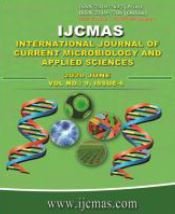


 National Academy of Agricultural Sciences (NAAS)
National Academy of Agricultural Sciences (NAAS)

|
PRINT ISSN : 2319-7692
Online ISSN : 2319-7706 Issues : 12 per year Publisher : Excellent Publishers Email : editorijcmas@gmail.com / submit@ijcmas.com Editor-in-chief: Dr.M.Prakash Index Copernicus ICV 2018: 95.39 NAAS RATING 2020: 5.38 |
Sodicity is a major abiotic stress reducing the yield of a wide variety of crops all over the world. In order to investigate the antioxidant enzymes activity of 30 mithipagal genotypes in relation to the sodicity tolerance study was taken up at Horticultural College and Research Institute for Women, Tiruchirappalli during Kharif season of 2017. When plants are exposed to severe salt stress, suffer from membrane destabilization and general nutrient imbalances that alter their physiology and defence mechanisms. The antioxidant enzyme system of plants plays an important role in the scavenging of Reactive Oxygen Species (ROS) that accumulate during stress and is the first line of defence to counter the deleterious stress effects. Proline content significantly increased in salt-tolerant mithipagal genotypes and the highest proline content was obtained from MCM-19 (Naduvakurichi local) under sodic soil condition. Catalase and peroxidase activities significantly decreased in salt-sensitive genotype whereas significantly increased in salt-tolerant genotypes. The salt-tolerant genotype MCM-19 (Naduvakurichi local) maintained higher levels of chlorophyll and proline contents as well as catalase and peroxidase activities under sodic soil condition followed by MCM-22 (Puthiyamputhur local) and MCM-21 (Arupukottai local), thus, this might be the underlying mechanism for salt tolerance.
 |
 |
 |
 |
 |